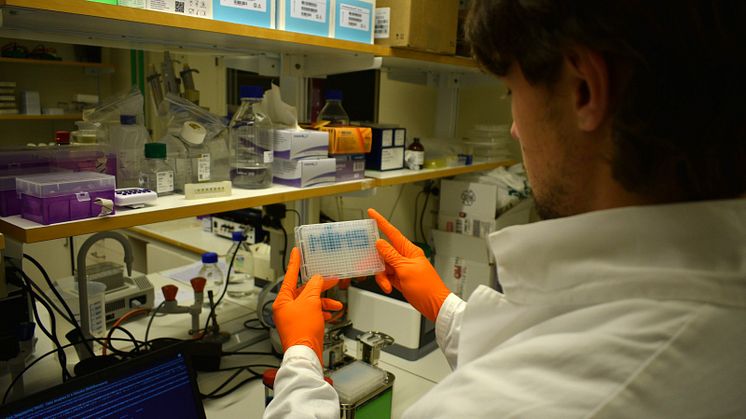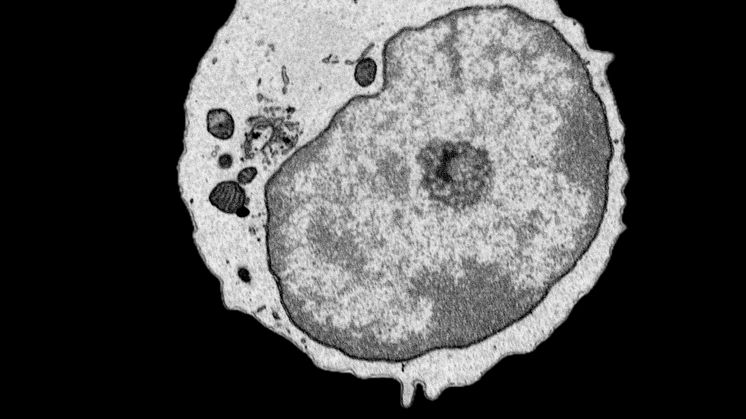
Press release -
Immune system DNA holds key for multiple disease personalised therapies
Some people naturally have higher levels of proteins that protect them from covid-19. New studies at Umeå University of our immune system may pave the way for more personalised treatments of both covid-19 and autoimmune disorders.
In his doctoral research at Umeå University and the Industrial Doctoral School, Ionut Sebastian Mihai has explored how our body's defense system works at the smallest level to find new ways to treat diseases like covid-19 and autoimmune disorders.
One of his findings involves natural proteins, called serpins, that can block the SARS-CoV-2 virus – the virus responsible for covid-19 – from entering human cells. Remarkably, some individuals naturally have higher levels of these proteins.
“Think of these proteins as gatekeepers that keep the virus out. This discovery could lead to new treatments that enhance these gatekeeper mechanisms in other people,” says Ionut Sebastian Mihai.
Serpins work by inhibiting a specific enzyme which the virus uses to enter cells. Individuals with higher levels of serpins in their lung cells may therefore have increased resistance to covid-19. This finding suggests potential avenues for developing treatments that enhance natural defenses against the virus.
Ionut Sebastian Mihai's research has also shed light on other critical components of the immune defense system, which is like a complex army with different types of soldiers, each playing a unique role in protecting us from illnesses. One of these soldiers is a special type of white blood cell that helps coordinate the body's response to threats, called T cells. Ionut Sebastian Mihai has identified important "commanders" within these white blood cells, directing how they grown and respond to infections.
“Understanding these cells at the DNA and RNA levels can help us find ways to develop vaccines and medicines that can boost the immune system when it is weak or calm it down when it is overactive,” says Ionut Sebastian Mihai.
The new research results could lead to therapies tailored to each person's unique immune system, making treatments more effective with fewer side effects.
“For people whose immune systems mistakenly attack their own bodies, for example, as seen in autoimmune diseases like multiple sclerosis or rheumatoid arthritis, this research offers hope for treatments that can correct these mistakes. Same goes for hard to deal infections and certain types of cancer. The secret is in the genes and the environment.”
Ionut Sebastian Mihai has also studied how certain viruses spread in the brain and identified signals in the immune system that help these infections progress. These findings could contribute to methods for preventing or treating severe brain diseases caused by viruses.
Ionut Sebastian Mihai’s doctoral project has been funded by the Industrial Doctoral School at Umeå University and Sartorius Stedim Data Analytics.
About the doctoral thesis
On Monday 25 November, Ionut Sebastian Mihai, Department of Molecular Biology, defended his thesis entitled “A systems biology single cell approach for querying the differentiation of immune system and antiviral response”. The faculty opponent was Dr. Karine Chemin, from Karolinska Institutet.
About the Industrial Doctoral School
The Industrial Doctoral School is based on collaboration between the University, researchers and businesses or organisations. The aim is to combine benefits for both society and the external party while training new high-quality researchers. The doctoral student also receives a tailored academic course package. The doctoral school is open to all disciplines and the doctoral student is employed at Umeå University.
Read more on the Industrial Doctoral School website
For more information, please contact:
Ionut Sebastian Mihai, Department of Molecular Biology, Umeå University
Phone: +76 445 20 75
Email: ionut.sebastian.mihai@umu.se
Topics
Categories
Umeå University is a comprehensive university and one of Sweden’s largest higher education institutions with around 38,000 students and 4,600 staff. We have a diverse range of high-quality educational programmes and research within all disciplinary domains and the arts. The University offers world-class educational and research environments and helps expand knowledge of global significance. This is where the groundbreaking discovery was made of the CRISPR-Cas9 gene-editing tool, which was awarded the Nobel Prize in Chemistry. At Umeå University, everything is just around the corner. Our tightly knit campus makes it easy to meet, collaborate and share knowledge, something that encourages a dynamic and open culture.



